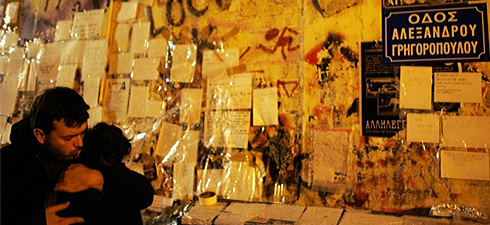The Albanian is a legitimate businessman today, and the young girl from the wealthy neighborhood of Ekali has grown into a little troublemaker. The good old anarchist sending the pseudo-revolutionary neophytes back to their studies, the Cypriot hotelier who becomes the best friend of Japanese tourists, and the former prisoner now an organiser of cultural events can all be found around Exarchia Square, a rallying point for the capital’s youth come by to savour the myth of the square, which a PASOK [Greece’s socialist party] chief wants to turn into a parking lot.
In the heart of Athens, by day the square, like a snake shedding its skin, turns into something else, a mix of races, of shops opening and closing (thanks to Molotov cocktails, of course), watching over its restaurants, the Rozalia tavern and the Floral, and even the Riviera cinema. Not to mention its two kiosks, the statue of the lovers and two or three other things. A visit late in the day can confirm that the crisis has left its marks, but it can also reveal what never changes about Exarchia, the most restive neighbourhood in Greece ever since the fall of the dictatorship and even warned of as such by the U.S. State Department.
Loud music, convertibles and criminals
At night the square often welcomes amateur DJs or live bands. Whether they are there or not, though, there is always loud music: "We want the loud music and happenings to keep out the junkies, counterfeit goods traffickers and the Albanian mafia,” explains a concert organiser. Despite the deafening music, the square also pulls in youngsters who play football, drink beer and talk in small groups – about everything except politics. On Exarchia Square at night political debate barely exists.
How to discuss politics if, from 11 p.m. on, the Mini Coopers, BMW convertibles and Audis descend from posh neighbourhoods to disgorge their young occupants into the cafeterias around the square? Often these are bands of girls tottering on 15-centimetre heels or wearing Tod sandals, dressed in Prada and carrying Louis Vuitton bags. They drink a few beers, enjoying just for a night the mythical atmosphere of Exarchia Square. Sometimes a whiff of weed floats over from the neighbouring tables, from a group of young men, in t-shirts sporting revolutionary slogans, with carefully groomed coiffures.
Who can stop them? No one. The “hats" are not welcome on the square, local residents explain. Nor are any uniforms, in general, from the police to the tax-fraud squad. If anything happens, the police might not show up. Or they’ll wait until daylight. Giorgos Apostolopoulos, municipal councillor close to the mayor of Athens, once called the police station at night to complain about the blaring music. The duty officer told him that he would inform his higher-up and brushed him off.
Exarchia also plays home to its own set of "criminal elements", as the Pakistanis who sell smuggled cigarettes or the mafia of Albanian traffickers are referred to. Residents do clean up the square themselves, however, by chasing them out regularly. And the anarchists are not the last to do their bit.
Attacks with clubs and cheap beer
Giorgia Blani ran a jewellery shop on the square and often witnessed attacks with clubs. “Don’t think this place is always spilling over with people. Every year at the anniversary of the uprising against the dictatorship, November 17, people get out of sight. They’re afraid, and it’s getting more and more dangerous,” she says. Especially if someone with a crewcut skulks down the street. He may be taken for a “fascist” and beaten with clubs.
Others argue that the crisis has done Exarchia some good. Of course, libraries have closed and small businesses have drawn their shutters, but small bars have also sprung up and are selling very cheap beer. There is good free music from various bands, and it’s all well above board. At Vox, a former cinema converted into a squat, a social café has opened: the drinks are cheap, and there is no receipt. Evicting the squatters and shutting down the old cinema for good is proving difficult. The last time the police tried, the anarchists came back three days later to force the lock and move back in. They’re still living there.
It’s a myth, though, that the square is home only to the anarchists. With the return of heroin, Exarchia has changed. The hooligans from neighbouring Messolonghi Street, the most dangerous street in the capital, lurk around the square. The “old-timers” of the square, often friends or classmates of Alexis Grigoropoulos (the 15-year-old boy killed near the square by a police bullet in December 2008), are wary. Organisations like the Anarcho-Syndicalist Initiative or the Anarchists for Social Liberation are seen as the most civilised groups on Exarchia Square, because they are the only ones to keep membership lists.
They advocate anarcho-syndicalism, born during the Spanish Civil War, and social anarchism, a communist derivative of anarchism. They stake out their territory with black flags during protests, but have held back from taking part in the movement of the “Indignados” because they consider it an initiative of the petty bourgeoisie. For them, fighting to tear up the memorandum (signed by the Government with the EU-ECB-IMF troika) is the only fight against total capitalism worth fighting.
Was this article useful? If so we are delighted!
It is freely available because we believe that the right to free and independent information is essential for democracy. But this right is not guaranteed forever, and independence comes at a cost. We need your support in order to continue publishing independent, multilingual news for all Europeans.
Discover our subscription offers and their exclusive benefits and become a member of our community now!












